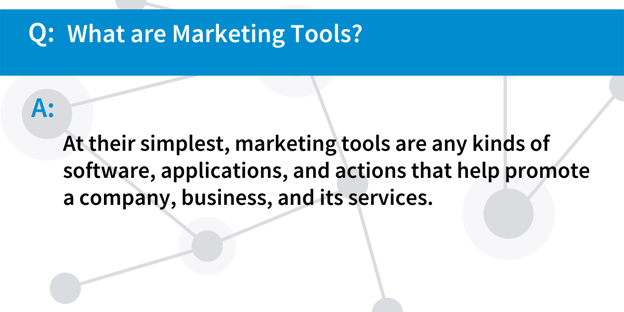What are Content Marketing Tools?
November 24, 2020 •DJ Team

You can create content to your heart’s content, but you need two things in order to make sure you’re building a successful plan.
The first thing? Strategy. Creating content without any idea where you want to go or what you want it to do just means adding more information to the internet.
Second, you need tools to prove that what you’re doing is working (or not), and that will help you adjust your content to better suit your needs.
When we start to talk about tools, though, things can get murky. What do you need your tools to do? To make it more complicated, there are dozens and dozens of specialized content marketing tools that offer you specific benefits—and hundreds more that are more generalized marketing and digital marketing tools that have some specific elements aimed at content marketing.
Let’s look at what they are, what they do, and what you need to make the best decisions for your own strategy.
What are Marketing Tools?
At their simplest, marketing tools are any kinds of software, applications, and actions that help promote a company, business, and its services.
Some tools help you maintain your strategy and keep your marketing in line. Others will help you see what’s working and what isn’t, so you can pivot and make adjustments to your plan as you go.
When you’re looking for tools to add to your kit, you want things that best fit with the type of marketing you’re doing and the content you’re creating. Most importantly, the tools you choose for your marketing need to make your job easier—not harder. While you may need to adapt your system, ideally the new system will remove a lot of the pain points from the work you’re doing every day.

Looking for help writing content? Not sure exactly what content to create? DemandJump can help. With automated content outlines on any topic important to your company, you will create content ensured to rank and be seen by your target audience.
List of Marketing Tools and Techniques
There are a lot of marketing tools and techniques out there. Where do you even start? Here are a few that can help get your content focused and aligned. Many of these tools have scalable solutions, so whether you’re a team of one or part of a much larger team, you’ll find options here that should work for you.
Evernote - Keep all of your notes—seriously, all of them—in one place. And not just any place. A place that’s searchable, shareable, and accessible from anywhere. Evernote helps teams keep things straight and collaborate to make sure the right work is getting done on time.
Trello - Ever heard of a Kanban board? It’s an organizational tool that helps you keep work items straight. Each work item has a “card,” and you move them left or right depending on how close they are to being closed, or if they’re held up. Trello is that in digital, easy-to-use form.
MailChimp - MailChimp is email marketing made remarkably easy. It’s a simple way to build an email database, send emails and follow ups, see how many people are opening and clicking through, and improve on your emails one after another.
Hubspot - This is a jack-of-all-trades marketing software. It does a little bit of everything, from landing page management and social media marketing, to customer support and some SEO implementation as well.
Salesforce - Salesforce is the granddaddy of all sales software. It’s a cloud-based customer relationship management software that helps you keep track of all the leads in your funnel and make sure you’re hitting them at the right points to keep pushing them towards a sale.
This is list by no means exhaustive, but these are some heavy hitters in the marketing software world.
Content Marketing Software
Now, what about content marketing tools, specifically? Some of these are basic, like Wordpress for your blog and YouTube for any videos you produce. But how can you measure how effective these tactics are?
One of the big perks of content marketing is the increased traffic you can bring to your brand’s website through search engine rankings. Search engine optimization (SEO) is the practice of learning what specific language your target audiences use to find answers to their question, then utilizing that language in your content so it’s more likely to turn up higher in search results. You’ll notice there aren’t any SEO tools listed above. Many of the most popular SEO tools act as simple keyword planners; they help you learn which keywords you can compete for and how much traffic those keywords get on search engines. Most of them are geared more towards paid search, helping marketers plan their search advertising campaigns—and that’s not always going to give you clear direction for what you should be working to compete for in your content marketing strategies.

Instead, let’s look at what DemandJump does.
DemandJump puts all of your data into one place. You can see how things are performing from Facebook, Google, Hubspot, LinkedIn, and other platforms without compiling all the data yourself. From there, you can see the different ways your customers behave in different places, which gives you insights to creating better content for them—posts and videos they’re more likely to interact with.
It also gives you suggestions for what to do next, and specific recommendations per platform for how to improve your ROI from content you’re creating.
Remember, content marketing is all about providing relevant information that your customers want to interact with, find helpful, and that will draw them to you organically. Improving your content strategy using tools is a must. Try a free trial of DemandJump for seven days, and see what these helpful insights and suggestions can do for your business, and keep creating.
Featured Articles
Categories
- Attribution Tracking (13)
- Channel Optimization (11)
- Consumer Insights (68)
- Content Marketing (251)
- Data Science (8)
- Digital Marketing (6)
- Digital Transformation (26)
- Enterprise (10)
- Lead Generation (14)
- Market Intelligence (8)
- Marketing Analytics (39)
- Marketing Attribution (57)
- Marketing Management (153)
- Marketing Operations (86)
- Organic Search (222)
- Paid Search (52)
- Pillar-Based Marketing (63)
- Programmatic Advertising (9)
- SaaS Content (14)
- SaaS Marketing (29)
- Search Marketing (111)
- SEO Keyword Research (28)
- SEO Pillar (18)
- SEO Strategy (46)
- SMB (5)
- Website Content (12)


